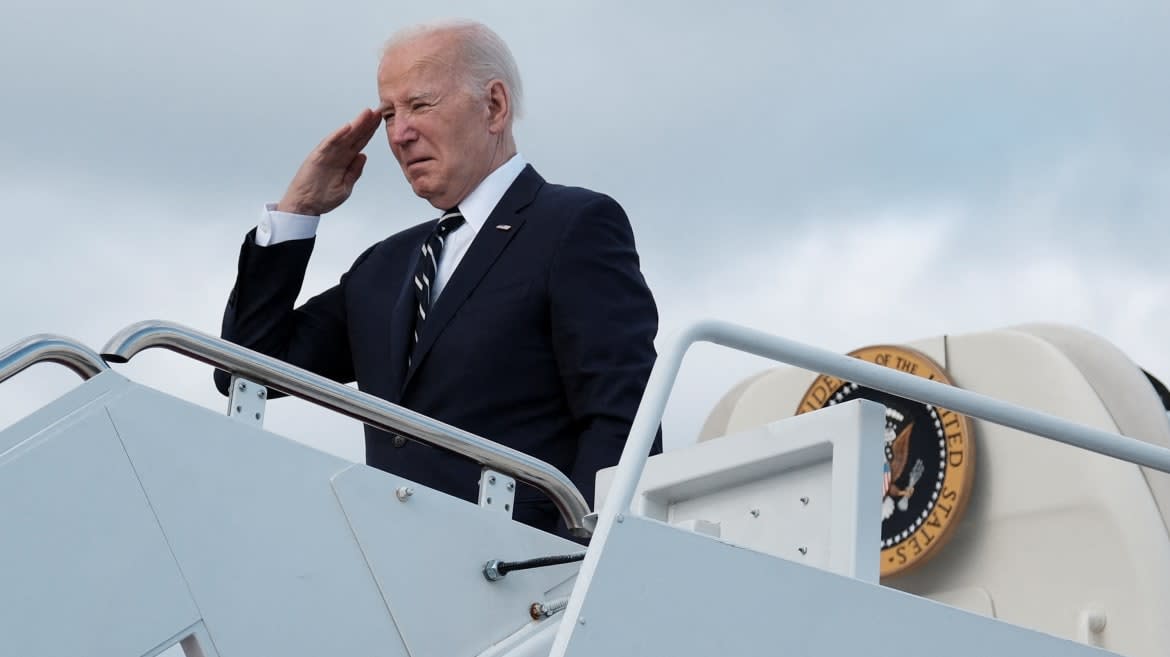How U.S. Literally Became Part of Israel’s Missile Defense System

- Oops!Something went wrong.Please try again later.
- Oops!Something went wrong.Please try again later.
President Joe Biden has told Israeli Prime Minister Benjamin Netanyahu that the U.S. would not support a retaliatory attack against Iran despite American forces playing a major role in intercepting Tehran’s unprecedented attack against Israel over the weekend.
After the attack—which involved 170 drones, 120 ballistic missiles, and 30 cruise missiles—Biden called Netanyahu to reaffirm U.S. support for Israel but said the American military would not join the Israel Defense Forces (IDF) in any potential strike against Iran, according to a White House official cited by The Times of Israel. Biden also encouraged the Israeli leader to “think carefully and strategically about the risk of escalation,” the official said, with the region perilously close to an all-out international conflict.
Israel Authorizes ‘Offensive and Defensive’ Action in Response to Iran Attacks
Despite Washington, D.C.’s reluctance to become embroiled in further military operations, the Pentagon played a significant part in taking out Tehran’s attack which had been launched in retaliation against an Israeli airstrike on an Iranian diplomatic compound in Syria that killed two generals. U.S. Central Command said its forces, supported by U.S. European Command destroyers, shot down over 80 drones and at least six ballistic missiles launched against Israel from Iran and Yemen.
“Iran’s continued unprecedented, malign, and reckless behavior endangers regional stability and the safety of U.S. and coalition force,” CENTCOM said in a statement. The armed forces of Britain, France, and Jordan also played a role in the defense of Israel, officials said, with Israel Defense Forces spokesperson Rear Adm. Daniel Hagari claiming that 99 percent of the Iranian projectiles were successfully intercepted.
Two U.S. fighter squadrons used F-15E Strike Eagles to destroy around 70 of the drones and they received a call from Biden afterwards, The Washington Post reports.
A senior military official also said that the USS Arleigh Burke and USS Carney stationed in the eastern Mediterranean Sea also took out between four and six of the ballistic missiles—effectively acting as part of Israel’s state defenses alongside its own formidable anti-missile systems. U.S. troops operating the Patriot missile defense system in Iraq also intercepted another missile that violated Iraqi airspace en route to Israel, according to the Post.
The U.S. and Israel have been working together for years on a Joint Task Force able to intercept an Iranian missile attack, with regular training exercises called Juniper Cobra.
“We call it a dress rehearsal because we understand that this can happen, and [the joint task force] can be activated at any moment,” Lt. Col. Tal Kaduri, head of cooperation for the Israel Air Defense Force, told Defense News in 2018.
U.S. Air Force Col. Justin Hickman, chief of staff of JTF—Israel at the time, also told Defense News that the U.S. and Israel had developed and practised tactics, techniques and procedures so intensely together that they had reached a point of very rapid interoperability.
Around half of the ballistic missiles fired by Iran didn’t reach their intended targets in Israel simply because they failed to launch or crashed, U.S. officials told The Wall Street Journal. “So much for the vaunted ballistic-missile capability of Iran,” one of the officials was quoted as saying.
But some of the weapons did make it through. A seven-year-old girl named Amina al-Hasoni was the only person seriously injured as a result of the Iranian barrage, according to reports. Hagari, the IDF spokesperson, said the Nevatim Airbase was struck by missiles that bypassed Israel’s defenses, but the base only sustained minor damage.
All eyes are now on how Netanyahu intends to respond to the attack. In a meeting Sunday, his war cabinet favored some form of retaliation, according to Reuters, though two senior Israeli ministers indicated that any counteroffensive was not imminent and that Israel would not act alone. “We will build a regional coalition and exact the price from Iran in the fashion and timing that is right for us,” minister Benny Gantz said ahead of the meeting.
Major General Mohammad Bagheri, the Iranian army’s chief of staff, also warned over the weekend that Tehran’s response “will be much larger than tonight’s military action if Israel retaliates against Iran,” adding that U.S. bases could face attacks if it helps Israel strike back.
At an emergency meeting of the U.N. Security Council Sunday, Robert Wood, the deputy U.S. ambassador to the U.N., said: “Let me be clear: if Iran or its proxies take actions against the United States or further action against Israel, Iran will be held responsible.” The sentiment echoed a statement from Biden a day earlier acknowledging that “while we have not seen attacks on our forces or facilities today, we will remain vigilant to all threats and will not hesitate to take all necessary action to protect our people.”
Get the Daily Beast's biggest scoops and scandals delivered right to your inbox. Sign up now.
Stay informed and gain unlimited access to the Daily Beast's unmatched reporting. Subscribe now.

